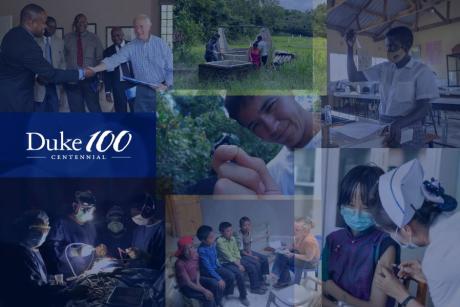Published August 5, 2008, last updated on March 8, 2013 under Research News
Duke recruited both scholars through the new Joint School – University Institute Hiring program (part of the Faculty Enhancement Initiative), which encourages collaboration between Schools and University Institutes or Centers for joint hiring of interdisciplinary scholars. According to Susan Roth, Vice Provost for Interdisciplinary Studies, “the success of this initiative is already evident in the recruitment of these two outstanding scholars who will make important contributions to the work of their home departments, to the Duke Global Health Institute, and to the University’s commitment to interdisciplinary studies in the service of society.”
Jen’nan Read brings to Duke a strong interest in gender, ethnicity, religion and health, particularly looking at gender- and ethnicity-based disparities in health among U.S immigrants. She received her Ph.D. and M.A. in sociology from University of Texas at Austin, completed a postdoctoral fellowship at Rice University, and then joined the faculty in the Department of Sociology at University of California-Irvine. From 2006-09, she was also a Carnegie Scholar, an honor limited to twenty scholars each year. Her focus during this time has been research on the political integration of U.S. Muslims. (Read her recent op-ed about the diversity among Muslim-Americans).
Read has published numerous papers on how race, ethnicity and gender affect health outcomes in the U.S., particularly for Arab women. She is interested in expanding her global health research to investigate the health issues of Arab women living in Middle Eastern countries. “I lived in Libya and Egypt for several years during my childhood. I want to apply my personal knowledge and understanding of the Middle East to health disparities research,” she says.
In addition to her teaching and research as an Associate Professor of Sociology, Read will lead the Duke Global Health Institute’s new interdisciplinary postdoctoral fellows program.
M. Giovanna Merli comes to Duke from the Department of Sociology at the University of Wisconsin – Madison. Her research straddles three disciplinary realms: demography, contemporary Chinese society, and global health. She is particularly interested in studying HIV/AIDS in two very different settings of the global epidemic: China and South Africa. “In China, I delve into issues with significant policy implications – from fertility, family planning, and population growth to the social and behavioral determinants of HIV/AIDS and other sexually transmitted diseases,” she says. “My research combines social scientific and epidemiological approaches to identify the social patterns that create conditions which put individuals at risk of infection.”
In South Africa, her research focuses on how HIV/AIDS affects families, and how traditional family social safety nets are responding to the AIDS crisis.
Merli received her M.A. and Ph.D. in Demography from the University of Pennsylvania, and an M.A. in International Relations from the Paul H. Nitze School of Advanced International Studies at the Johns Hopkins University. A native of Italy, she received her B.A. in Oriental Languages and Literatures from the University of Venice.
“Jen’nan and Giovanna bring exciting expertise and a true commitment to research that reaches across traditional academic boundaries,” says Michael Merson, director of the Duke Global Health Institute. “Jen’nan’s interest in health outcomes of Arab women in the Middle East is unique and will make important contributions to global health. Giovanna’s expertise in the social dynamics around HIV/AIDS and reproductive health in such diverse cultures as China and South Africa is an exciting blend of academic spheres. The arrival of these two scholars strengthens Duke’s dedication to an interdisciplinary approach to education and research. I look forward to the knowledge and leadership they will bring to Duke and to the Duke Global Health Institute.”


